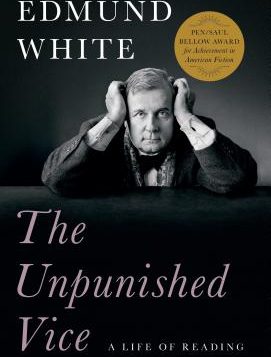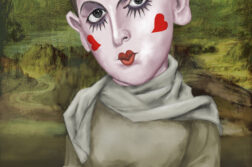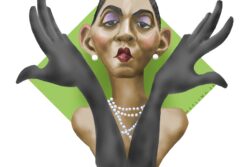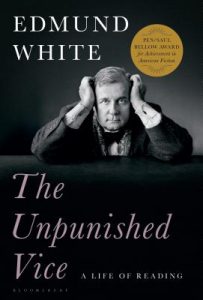 The Unpunished Vice: A Life of Reading
The Unpunished Vice: A Life of Reading
by Edmund White
Bloomsbury, 240 pages. $28.
IT’S HARD not to think of Edmund White as the dean of gay American writing. In a career that spans 45 years, he has published 28 books—novels, biographies, essays, memoirs, travel books, and the classic he co-authored with Charles Silverstein, The Joy of Gay Sex. Through reviewing their books and generously contributing jacket blurbs, White has supported countless emerging writers. He is unabashed about labeling himself a gay writer, one who has benefitted from being in that niche market for many years. “I may never be so well known as John Updike,” he says, “but to my few readers I’m indispensable.”
White is also a passionate reader, “always sniffing out more and more titles.” Books—“huge, teetering piles of books”—feed “a hobby that never grows stale.” It is this “unpunished vice” of his life of reading that gives White the title and the theme for his latest opus, an intelligent and often delicious meditation on the books he has read, and some that he has written. The Unpunished Vice is a smart, genial, and always interesting account of his literary life.
A “scrawny gay boy, virtually friendless and powerless,” White was a “strange adolescent” for whom “books were my constant companions during those horny teenage years.” At a time when there were no out actors or politicians, books—by gay authors like Isherwood, Baldwin, Gide, Mikhail Kuzmin, and Umberto Saba—played an important part in the formation of his sexual identity.
Early on, too, Chinese poetry with its “muted eroticism” and Japanese fiction of the Heian dynasty caught his attention. The Tale of Genji, which depicts the frequent, random, and even violent nocturnal encounters of his protagonist, struck him “as inconsequential and as natural as a gay man’s tricks,” and inspired him when he was writing his first published novel, Forgetting Elena.
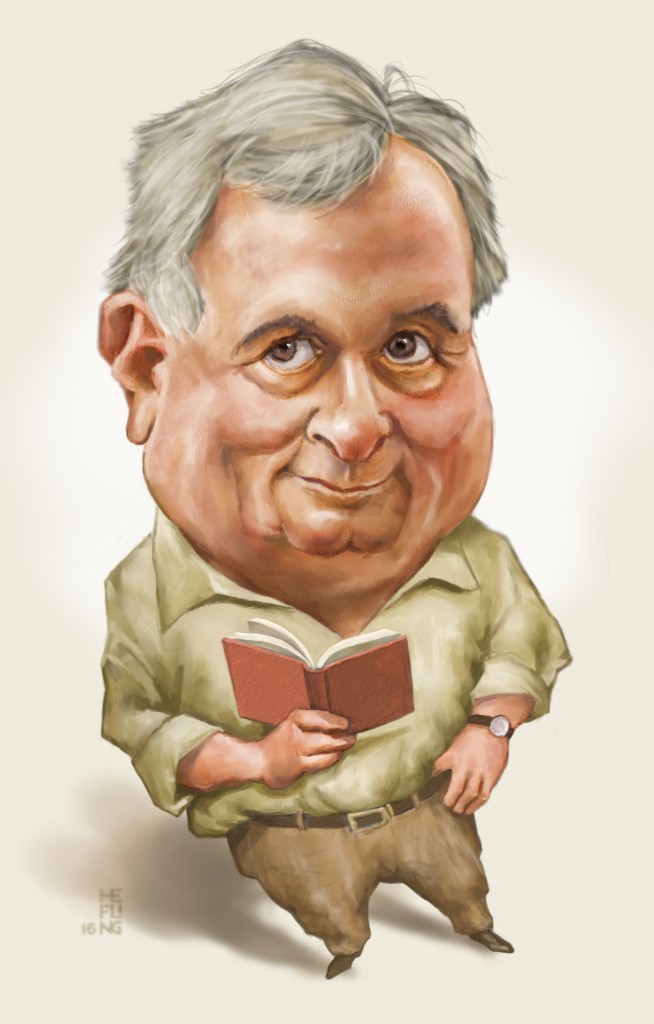 White’s favorite 20th-century Japanese fiction writers are Jun’ichirō Tanizaki and Yasunari Kawabata, and he praises both for showing that “there’s more to contemporary literature than American coffee-cup realism.”What he prizes in these writers, and many others, is strangeness, an idea that runs throughout The Unpunished Vice. “Just as I wanted to explore unfamiliar religions and languages, I wanted to discover strange codes of behavior.”
White’s favorite 20th-century Japanese fiction writers are Jun’ichirō Tanizaki and Yasunari Kawabata, and he praises both for showing that “there’s more to contemporary literature than American coffee-cup realism.”What he prizes in these writers, and many others, is strangeness, an idea that runs throughout The Unpunished Vice. “Just as I wanted to explore unfamiliar religions and languages, I wanted to discover strange codes of behavior.”
White calls himself a “tireless if slow reader.” I can believe the “tireless,” but how slow a reader can he be to have gotten through the prodigious number of books he references in these pages? He is especially attracted to difficult and ambitious fiction—what he calls “polyphonic” fiction—“because I want to remind myself how good you have to be to be any good at all.”
It would take paragraphs to mention all of the books and authors White discusses as favorites. Many would make anyone’s list—Proust, of course, about whom he has written a fine short biography; Colette (“a narrow genius but a very deep talent”); Tolstoy, whose Anna Karenina White calls “the greatest novel in all literature”; Rebecca West (“an incomparable writer”); and Nabokov, to name a few. The greater part of one chapter is devoted to an appreciation of Nabokov’s fiction, whose Pale Fire he calls “the great gay comic novel.”
White also addresses new trends in literature. “The border between fiction and nonfiction is getting thinner and thinner,” he writes, citing Karl Øve Knausgaard’s six-volume My Struggle as a prime example. “No one has ever attempted this level of micro-confession before.” He notes other examples of the latest trends in fiction: the dystopian novel, the “renewed historical novel” (with its “zeroing in on telling detail”), and the “admission of new voices previously unheard or silenced.” Naturally, in this latter category, he includes gay novels, tipping his hat to the “new crop” of excellent gay writers, among them Garth Greenwell, Paul Lisicky, Hanya Yanagihara, and Ocean Vuong.
Throughout The Unpunished Vice, White cannot resist discussing his own writing career as well. His early (and unpublished) novels were virtually diaries. “I wrote about myself with frigid disdain in the third person as a lamentable character. … That was the era (1961) when gays were supposed to be sad, lonely, and certainly repellant. But everything in my book was impertinent and irritable. We didn’t know yet how to be cool and assertive about our homosexuality.” He says that during the AIDS crisis his ideal reader switched from a cultured European to an American gay man.
He is also quite sober about the permanence of his own reputation. “At my age (seventy-eight), I realize that everyone, or almost everyone except Hitler, will be forgotten from this period; if a writer can shore up an eroding coastline for a decade or two, that’s the only ‘immortality’ we’ll ever know on this dying planet.” He’s equally candid about his life—not only his reading life, but also his sex life, his love life, his friends, his health, his body. “Since I’m the age of everyone’s grandfather,” he writes, “I’m not looking for a job or money or sex, or not much of it. I just want companionship, and even for that I have a wide selection to choose from.”
Indeed, he is an unrepentant name-dropper. The catalogue of his acquaintances and friends—literary and otherwise—is a who’s who of artists and writers of the late 20th century: Michel Foucault, Peggy Guggenheim (to whom he read Henry James in her private gondola), poets J.D. McClatchy and James Merrill, James Salter (“one of my favorite writers”), novelist Michael Ondaatje, Boris Kochno (secretary to the ballet impresario Sergei Diaghilev), French photographer Ariane Lopez-Huici (“the niece of Arturo Lopez, Paris’s biggest party giver in the 1950s”), John Irving (“one of my best friends”), Alison Lurie (“she knows exactly how to be a successful old person”), and the Princesse de Caraman-Chimay, whose great-grandfather was Proust’s model for the Duc de Guermantes. It’s a mouthwatering list, but one that may cause a few readers to raise their eyebrows in annoyed impatience with his fulsome self-regard.
This book also introduced me to a number of writers I had never heard of, among them Pierre Guyotat, a “transgressive writer” whose books were censored by the French government, W. H. Spackman (“unpunctuated, fluty, scatterbrained sentences”), Neel Mukherjee (“our Tolstoy today?” he asks), and Curzio Malaparte, who wrote “two of the most memorable books about World War II.”
The Unpunished Vice is a captivating wander through all of this—books familiar and not, the writing life, his personal life. White’s self-described “rambling style” is never abstruse, always engaging. His prose is, as gay poet James Merrill once said in another context, a courtesy to the reader.
In the coda, White notes that silent, solitary reading “is the best conversation.” In the Renaissance, he says, conversation aimed to “avoid pedantry and cruelty and seek above all to please and to entertain. … Good conversation should not make anyone feel inferior or ill at ease but rather the object of a total consideration.” No better description of White’s own conversation with the reader could be made. The Unpunished Vice is a delight on every page.
Philip Gambone is the author of four books, includingSomething Inside: Conversations with Gay Fiction Writers, which contains his 1995 interview with Edmund White.


